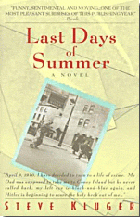
 Andy Barriger, a
best-selling writer, whose work
includes Finding Faith
and Finding Peace
reviews Steve
Kluger's Last Days of Summer.
Andy Barriger, a
best-selling writer, whose work
includes Finding Faith
and Finding Peace
reviews Steve
Kluger's Last Days of Summer.As The Independent Gay Writer does, on occasion, we will run a review of a non-glbt work. Andy enjoyed this book for its wit and heart, which come to think of it reflects his own writing.
by Steve Kluger
(Perennial, April 6, 1999. $13.00 Paperback. ISBN 0380797631)
In Brooklyn, 1940, a young twelve-year-old boy is coming of age in a world where he doesn’t belong. His wealthy father has recently divorced his mother, leaving her all but broke, and she is forced to move herself and her son to an Italian dominated part of Brooklyn, leaving him the only Jew in the area. As the incidents of abuse from other boys in the neighborhood mount, young Joey writes to ball player Charlie Banks on the Giants’ baseball team, asking for him to hit a home run and say, preferably on the radio, that it was for him. What ensues is one of the most touching, moving stories I have read in many years.
In the Last Days of Summer, Author Steve Kluger weaves an unlikely tale of a young boy who has a much larger impact on the world at large than he can possibly understand, and Kluger does so through a technique of letting the reader into the boy’s life through his letters and newspaper clippings. What at first might seem like a clunky or silly gimmick turns into a warm, unusually involved reading experience. By the end of the book, the reader is left feeling as though all of the characters are personal friends, and are far more real than mere letters on a page.
Kluger has obviously done his homework, referencing a massive series of facts and statistics running the gambit from Hitler’s invasions of European nations to baseball scores, to national politics in the early 1940’s. The main character, Joey Margolis, corresponds with people ranging from Hollywood personalities to community leaders, and even FDR himself.
Speaking as a writer, I can offer no higher praise for a fellow author’s work than to say his characters were so believable and well envisioned that I feel as though I could pass them on the street or pick up the phone and dial their numbers. Through his technique of allowing the reader to peer of the shoulders of the characters and read their correspondence, Kluger has given an unusual window into their hearts and minds. In the context of the story, it is far more powerful than any prose could be.
Don’t pass this book by. It will stay with you, in your heart and in your mind, for many years to come, and I give it my highest recommendation.
Andrew Barriger, Author of Finding Faith